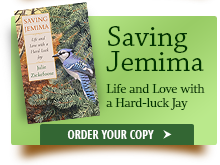I'm a bit erratic of late, but trying hard to bring the blog back up to at least twice weekly. There's so much living to do. In nesting season interesting, time-consuming things get thrown in my lap on a daily basis, things I can't ignore, things that need to be done. And then there's the momentous fledging of Phoebe, and that's been an energetic investment of its own. I've little energy or time left over for telling stories, and I have so many stories to tell. They're stacked to the ceiling. And I can only tell them one at a time, when I'm not rushing to or from somewhere or buried deep into a project.
A Carolina wren who fledged 4.5 young out of our copper bucket under the front eave on June 4 is now incubating five more full-term eggs in a Gilbertson PVC box in the backyard! Cheepy's Mom has got it goin' on.
The peach, named Defiance, weeps gelatinous tears over its encounter with periodical cicadas, who have slit its bark and laid eggs in every branch. Damn. That peach had had it already with the freeze May 10. And yet cicadas bet that the tree they lay eggs in will still be alive in 17 years. That's why they go for young ones, in the middle of open spaces. Like fruit trees. Like me, trying to get from the house to the car. You've got all this open space, and you aim directly for my face. But they're dying now, and a part of me kind of misses the hubbub. Like 1% of me.

A dogbane beetle, my first of the year, chews the edge of a milk-sapped leaf, deadly poison to any but he. If his chrome Jacob's coat doesn't yell DO NOT EAT ME, nothing does. Admire me. Eat at your peril. I'm sad that goldenrod has choked almost all the dogbane out of our prairie patch. Nothing stays the same. I love dogbane and so do silver-spotted skippers, fritillaries, and hairstreaks, who sip its nectar. But serving as fodder for dogbane beetles is clearly its highest use.
A friend came to visit, to see the place and meet me and the family, and I saved my yard bluebird box check for when she was here. As soon as I opened the garden box I saw something that brought me up short. Do you see it?
When you've been tending bluebird boxes for 34 years, you know enough to say "Uh-oh" when you see a runt like the one at the top of the heap there. It's at least three days behind its siblings. They're six days old, and this little thing is barely three days old, developmentally. It may have hatched soon after they did, but it's not getting enough food and is only going to fall farther and farther behind.
I closed the box and thought about it. The instant I saw this chick, I could see its future rolling out. Experience has shown me this: Starting smaller than the res, it would be the most vigorous begger in the brood, and ironically enough it would get the least food. Come fledging time, about two weeks from now, it would still be largely unfeathered, while its fully-feathered siblings would be crowding the entry hole, taking all the food. And when they fledged, flying strongly, if this bird was even still alive, it would be left sitting in the box, calling and calling in that lonely nasal Ne-nu! Ne-nu! of baby bluebirds. The parents would return occasionally to look at it, but they probably wouldn't waste time and resources feeding it. If it jumped out of the box from sheer desperation, it would be reduced to hopping across the yard, easy prey for anything walking or flying by. And then it would become my problem. If I know anything after all these years, I know my heart. It is strong, and weak, too.

Unless...That evening, a solution presented itself to me. I'd go out first thing in the morning, and I knew that when I'd open the box, that chick would be standing up with hunger. I'd be ready with my tweezers, and I'd pop some tender mealworm pupae in its little gob, and when it was full I'd drive it a half mile to a box of bluebirds that hatched only yesterday. I'd slip it into that brood and then, and only then, would it have a snowball's chance of becoming a bird.
Overnight a huge storm front came through, with 2.65" of blessed rain. The lawn, concrete-hard for weeks, now gives a little when I walk on it. It's not soggy by any means, but THAT was exactly what we needed. I felt every cell in my body rejoice for the hen box turtles who've been plodding around for a couple of weeks, holding their eggs in because they couldn't dig in the concrete-hard soil.
And when Liam and I went out this morning to fetch the chick, it all rolled out just as I'd envisioned.
That tiny runt was standing up with hunger. It didn't care that I wasn't a bluebird. I fed it the first pupa (you can see a white bulge in its craw) and it voided the tiniest of fecal sacs. You can see that dropping right behind its head. Oh my. You are starving indeed, my love.
Three pupae later it was finally quiet. Its fat little siblings didn't need to beg; their parents had filled them with rain-fresh insects. Bluebirds don't waste food on those who aren't thriving. It's the wisdom of wild things. It can seem dispassionate, even cruel, but it makes sense for survival. Bluebirds are a lot smarter than I am. They don't let emotion rule. They look at that bird and say, "You're not going to catch up no matter what. Here's the deal. I'll feed you if and only if I have a surplus."
So the runt overcompensates by begging at the slightest stimulus. It's trying so hard to overcome its lousy lotto number and survive.
I took the babe, now full and sleepy and wondering what the heck was happening, and installed it in a temporary nest.
My handsome son, driving Ms. Crazy and her dashing sidekick to our destination a half-mile away, a bluebird box on the edge of a huge hayfield.
Tender solicitude from a sweetly frosted gemmun.
I peeked in the box: four two-day old chicks. They could surely handle a fifth.
The foster child, slipped in to the left side. A far more harmonious sight than when viewed in its own nest. You'd hardly notice the anomaly. Yes, it's bigger than its new siblings, but given its slow start in life, I have a feeling you won't be able to tell it from them in a couple of days. Now it has a chance to grow up, a flying chance to be a bluebird.
I want to say, as a not-so-poetic but vital postscript, that none of this slick cross-fostering stuff would have been possible had I not been checking my 26 bluebird boxes once or twice weekly, and writing down what I found. Had I not been looking closely, comparing each chick to the other, and informed enough by years of working with bluebirds to be able to see the anomaly at a glance, the chick would almost certainly have died. Again and again, I see people observing nature, watching nest boxes, say, and never bothering to make a simple written note when eggs are laid, when chicks hatch; when they fledge. It makes life ever so much more interesting when you keep notes. It's the very stuff of educating oneself. And it makes interventions like this possible when you know without a doubt what you've got in every box. See a robin starting to incubate? Write it down! Then you can look up incubation and nestling periods, and you'll know when to expect hatchlings; when to expect fledglings. You'll be acting like a naturalist, not just a passive observer. You'll be participating in it all. And actively participating, not just watching, is how we learn.
I'll keep you in the loop. If you're already keeping nature notes, hooray! If you're not, consider this your kick in the pants toward your Science Chimp badge.



















14 comments:
And there is my kick in the pants, lol. I've been a somewhat passive observer-more likely to take a picture and then refer back to it or maybe put a note in my phone. Can't wait to see what happens with your little fosterling.
I can hear the conversation in that foster nest now. Mrs. B says, "did you put this here?" Mr. B says "no, I don't know anything about it, must have been that Zick woman who keeps peeking in our box." Mrs. B says, "1 more mouth to feed." She sighs, then grumbles, " well, that Zick better get here with some meal worms. I've got my beak full already!"
O-KAY! I've been watching our first ever nest of barn swallows. Seems like they are taking them out one at a time for practice flights? Never see more than one baby flying at a time...
http://myfavoritesheep.blogspot.com/2016/06/everyones-flying-coopor-nest.html
As I spend this morning saving horseshoe crabs that were silly enough to get trapped in the rocks, I think that helping those that can't help themselves is a very good way to spend ones time. Inspiring blog Julie!
This year I started recording my observations on Cornell's nestwatch site which has really helped me be diligent. The only boxes I have a hard time with are the house wrens because, even with a "viewing" panel (and an automotive mirror), I can't see inside to count the eggs. I can tell when they hatch because the activity in/out increases and know when they will fledge by counting from there. Much easier to monitor the chickadees and bluebirds on my property. I confess to being a bit addicted to watching all the nests around our place!
A good swift kick in the butt, indeed! Consider it done. How wonderful for your two helpmates. I following along with faith, admiring you all. *sigh*
What a story! Glad it worked as you had envisioned it. And love love love the photo of Chet and the baby bluebird. And the one with said handsome driver, Chet and baby bluebird! There's an osprey nest cam up on Hog Island, Maine, that I've been watching and one of the three chicks is way behind in growth. I can't watch it anymore because it breaks my heart when feeding time comes around and it isn't getting enough food.
Ma'am yes ma'am! Going to pencil in "hatched" for Monday. That would be Marge and Studley Windowsons' brood. I'm only guessing, because I don't have a peekaboo box, but I meant to write it down and forgot, so now I will.
Julie,
Thanks so much for all your nature watching and sharing. I've learned so much from you. And now I'm learning the next thing...time to start writing things down. I may also be inspired to get a couple more boxes set up in a field near us. Good luck to your little foster bird!
House full of notebooks. Mostly bird lists and dates. I really should do more.....
Thanks so much. I just wanted to say when my son's Bluebird box was invaded by house sparrows, you told us how to fix that. He made a rectangular entrance hole to cover the round one and raised the floor of the box. Now the House Sparrows hate that box and the Bluebirds lay multiple clutches a year. Love you, Julie, for sharing all your science chimpness.
Kathy in Delray Beach (with a son in Huntsville, AL) ps posting signed in as my husband for some reason!
So clever! We have a few Mountain Bluebirds here, but they like it a little lower down. I wonder if boxes would draw them up? In any event, it warms my heart to know someone is looking out for at least a few of the beauties. And Chet rocks as a baby bird sitter. :-)
As always, any wild critter in need lucky enough to cross paths with you, is the luckiest critter indeed. I laughed out loud about Liam driving Ms. Crazy. Funny, warm, and wonderful. Thank you for all that you do.
Such an inspiration! Thank you for the beautiful pictures.
Post a Comment